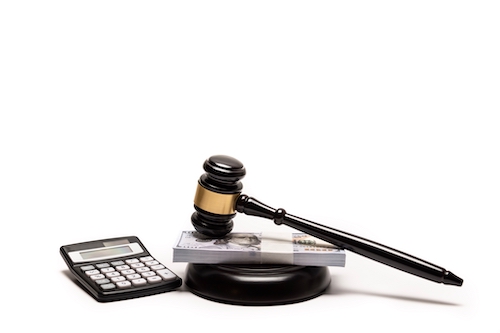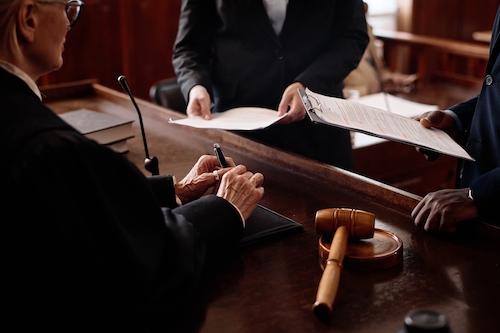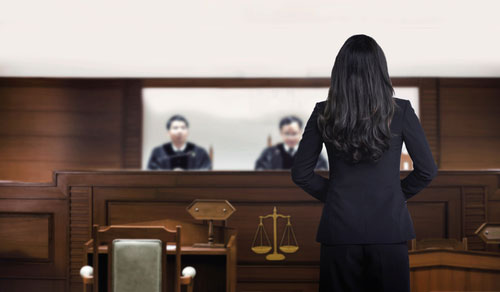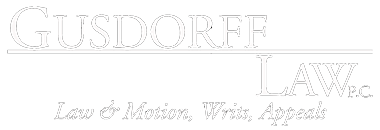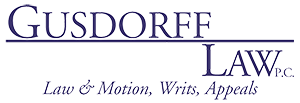Punitive damages in California serve a critical role in the legal system by punishing defendants for egregious conduct and deterring future wrongful acts.
As the name implies, punitive damages are intended to punish a defendant for particularly egregious conduct. These awards differ from compensatory damages, which compensate the plaintiff for his or her losses. When asserted against corporate defendants, punitive awards can be substantial.
Generally speaking, however, it is more difficult to win punitive damages and even harder to retain them on appeal. And because California statutes regulate them fairly closely and they can have substantial impact on the defendant, a punitive award will often be challenged.
If you’re a plaintiff seeking punitive damages, or you’ve had them awarded, the defendant may appeal. You deserve to know how the appellate courts will frame their review.
This guide delves into the intricacies of punitive damages, particularly in the context of California law, and provides a robust framework for understanding when and how these damages are awarded, the appeal process, and what plaintiffs need to know to uphold their claims.
The Basics of Punitive Damages
Punitive damages, unlike compensatory damages, are designed to punish the defendant for particularly despicable conduct and to deter similar actions in the future.
While compensatory damages aim to make the plaintiff whole by covering their losses, punitive damages go a step further in addressing the defendant’s wrongful conduct.
Key Concepts:
Compensatory Damages: Are awarded to the plaintiff to cover the losses they have incurred due to the defendant’s actions.
These damages aim to make the plaintiff whole, ensuring they are compensated for both economic and non-economic losses.
Types of Compensatory Damages:
- Economic Damages: These include tangible losses such as medical expenses, lost wages, and property damage. Economic damages are relatively easy to quantify as they involve specific monetary values.
- Non-Economic Damages: These cover intangible losses like pain and suffering, emotional distress, and loss of enjoyment of life. Non-economic damages are more subjective and can vary significantly from case to case.
Punitive Damages: are designed to punish the defendant for particularly egregious or despicable conduct and to deter similar actions in the future.
These damages are not tied to the plaintiff’s actual losses but rather to the nature of the defendant’s behavior.
Key Characteristics of Punitive Damages:
- Punishment: The primary purpose of punitive damages is to punish the defendant for their wrongful conduct. This punishment serves as a societal condemnation of the behavior.
- Deterrence: By imposing significant financial penalties, punitive damages act as a deterrent to the defendant and others from engaging in similar conduct.
Despicable Conduct: is a legal standard used to justify the award of punitive damages. This type of conduct is so vile, reprehensible, and morally corrupt that it goes beyond mere negligence or even gross negligence.
Examples of Despicable Conduct:
- Intentional Harm: Actions taken with the intent to cause physical or emotional injury to another person.
- Reckless Disregard: Behavior that shows a blatant disregard for the safety and well-being of others, such as knowingly selling defective products.
- Deceptive Practices: Engaging in fraud or deceit to the detriment of others, such as financial scams targeting vulnerable individuals.Grounds for Awarding Punitive Damages in California
Under California law, punitive damages can be awarded if the plaintiff provides clear and convincing evidence that the defendant’s conduct was oppressive, fraudulent, or malicious. Understanding these terms is crucial for both plaintiffs and defendants.
Oppression, Fraud, and Malice: Key Elements for Awarding Punitive Damages
In the context of punitive damages, certain types of conduct are considered particularly egregious and warrant additional penalties beyond compensatory damages.
The three primary categories of such conduct are oppression, fraud, and malice. Understanding these concepts is essential for anyone involved in litigation where punitive damages are sought.
Oppression: Cruel and Unjust Hardship: Oppression involves despicable conduct that subjects a person to cruel and unjust hardship in conscious disregard of their rights. This behavior goes beyond mere negligence or bad faith; it is a deliberate and knowing act that causes significant suffering to the victim.
Fraud: Deception with Intent to Harm: Fraud involves intentional misrepresentation, deceit, or concealment of material facts with the intent to injure or deprive someone of their rights. Fraudulent actions are characterized by their deliberate and deceptive nature, aimed at achieving unfair advantage or causing harm to others.
Malice: Intentional Harm and Disregard for Rights: Malice is defined as the intention to cause injury or a willful and conscious disregard for the rights of others. Malicious conduct is characterized by its deliberate intent to cause harm, showing a blatant indifference to the consequences of such actions on the victims.
Additional Requirements for Corporate Defendants
When punitive damages are sought against a corporate defendant, establishing corporate liability is crucial. It involves demonstrating that high-ranking officials within the corporation were either aware of or authorized the wrongful conduct. This section delves into the intricacies of corporate liability, emphasizing the roles of corporate officers and the impact on corporate policy.
Corporate Officer Involvement: The Role of Decision-Makers
Corporate Officer Involvement is a critical component in proving corporate liability for punitive damages. This requires showing that individuals in positions of significant authority within the corporation either knew about or sanctioned the misconduct.
Establishing Corporate Liability: A Multi-Faceted Approach
Proving corporate liability for punitive damages involves a multi-faceted approach, combining evidence of individual involvement with the broader impact on corporate policy.
Gathering Evidence:
- Internal Documents: Emails, memos, and other internal communications that show knowledge or authorization of the misconduct by high-ranking officials.
- Testimonies: Statements from employees or whistleblowers that can corroborate the involvement of senior management.
- Corporate Policies: Documents and records that demonstrate how the wrongful conduct was integrated into the company’s operational practices.
Legal Framework:
- Clear and Convincing Evidence: Plaintiffs must provide substantial proof that senior officials were aware of or authorized the wrongful conduct.
- Causal Link: Establishing a direct connection between the misconduct and the corporation’s policies or practices is essential for holding the corporation liable.
Corporate liability for punitive damages requires demonstrating that high-ranking officials within the corporation were involved in or authorized the wrongful conduct and that this behavior was tied to corporate policies. By providing clear and convincing evidence of these elements, plaintiffs can hold corporations accountable and ensure that punitive damages serve their purpose of punishment and deterrence
The Standard of Proof in Trial Courts
California trial courts require clear and convincing evidence to award punitive damages. This is a higher standard than the preponderance of the evidence used in most civil cases, reflecting the serious nature of punitive damages.
Clear and Convincing Evidence:
- Higher Burden: Plaintiffs must provide a high level of proof that the defendant’s actions were oppressive, fraudulent, or malicious.
- Evidence Examples: Internal emails, reports, employee testimony, and other substantial evidence.
Appealing a Punitive Damages Award
When a punitive damages award is appealed, the appellate court reviews the trial record to determine if there is substantial evidence supporting the jury’s findings. The appellate court does not reweigh the evidence but ensures that the trial court’s decision meets the clear and convincing standard.
Appellate Review:
- Substantial Evidence: The appellate court looks for sufficient evidence that a reasonable factfinder could find the facts highly probable.
- Corporate Defendants: The court examines if the decision-makers within the corporation were rightly held accountable.
Detailed Case Analysis: Hypothetical Case Study on Punitive Damages
Examining a hypothetical case can provide valuable insights into how punitive damages are awarded and upheld on appeal. This section will walk through a detailed case example to illustrate the process and the key elements involved.
Case Example: Fraudulent Activities Leading to Financial Harm
Plaintiff’s Claim: In this hypothetical scenario, the plaintiff alleges that a corporate defendant engaged in fraudulent activities that resulted in significant financial harm. The plaintiff claims that the defendant’s actions involved intentional misrepresentation and deceit, with the aim of causing financial loss to the plaintiff.
Key Allegations:
- Intentional Misrepresentation: The defendant provided false information regarding the financial stability of their company to induce the plaintiff into making substantial investments.
- Deceit and Concealment: The defendant concealed critical financial information that, if disclosed, would have deterred the plaintiff from investing.
- Financial Harm: As a result of the defendant’s fraudulent actions, the plaintiff suffered severe financial losses, including the depletion of investment funds and subsequent economic hardship.
Trial Court Decision
The trial court hears the case, and the jury evaluates the evidence presented by both parties. The plaintiff must meet the burden of proof, demonstrating clear and convincing evidence of the defendant’s fraudulent activities and malicious intent.
Jury Findings:
- Clear and Convincing Evidence: The jury finds that the plaintiff provided clear and convincing evidence that the defendant engaged in fraud and malice. This includes internal emails, financial documents, and witness testimonies that demonstrate the defendant’s intent to deceive.
- Punitive Damages Awarded: Based on the egregious nature of the defendant’s conduct, the jury awards punitive damages to the plaintiff. The award is intended to punish the defendant for their fraudulent behavior and to deter similar actions in the future.
Appeal Process
The defendant, unsatisfied with the trial court’s decision, decides to appeal the punitive damages award. The appeal challenges the sufficiency of the evidence and the appropriateness of the punitive damages.
Appellate Review:
- Reviewing the Record: The appellate court reviews the entire trial record, including all evidence and testimonies presented during the trial. The focus is on whether there is substantial evidence to support the jury’s findings.
- Substantial Evidence: The appellate court finds that the record contains substantial evidence supporting the jury’s verdict. This includes detailed internal communications that reveal the defendant’s knowledge and intent, as well as testimony from employees and financial experts.
- Clear and Convincing Standard: The appellate court confirms that the evidence meets the clear and convincing standard required for punitive damages. The court upholds the jury’s decision, affirming the punitive damages award.
Key Elements of the Case
Evidence Presented:
- Internal Communications: Emails and memos showing that senior management was aware of the financial instability and chose to misrepresent the company’s situation to potential investors.
- Financial Documents: Reports and documents that were altered or concealed to present a misleading picture of the company’s financial health.
- Witness Testimonies: Statements from employees and financial experts who provided insights into the defendant’s fraudulent practices and their impact on the plaintiff.
Legal Standards:
- Fraud and Malice: The plaintiff successfully demonstrated that the defendant’s actions were both fraudulent and malicious, justifying the award of punitive damages.
- Clear and Convincing Evidence: The evidence presented was compelling and credible, meeting the high standard required for punitive damages.
This hypothetical case study illustrates the complexities involved in seeking and defending a punitive damages award. By presenting clear and convincing evidence of fraud and malice, plaintiffs can secure punitive damages that serve to punish the defendant and deter future misconduct. Understanding the legal standards, gathering comprehensive evidence, and preparing for potential appeals are key elements in navigating the punitive damages landscape successfully.
Key Considerations for Plaintiffs
For plaintiffs involved in cases of punitive damages, understanding the legal requirements and the appellate process is crucial. Whether you are seeking punitive damages or defending an awarded punitive damages claim, effective legal representation and thorough preparation can significantly impact the outcome of your case. Here’s an expanded guide on the essential steps to take.
Steps to Take: Ensuring a Strong Legal Position
Successfully pursuing or defending a punitive damages award requires meticulous preparation and a deep understanding of the legal standards involved. Here are the key steps you should follow:
1. Gather Strong Evidence: Gathering Strong Evidence is the foundation of any successful punitive damages claim. The quality and comprehensiveness of your evidence can make or break your case.
2. Understand the Legal Standards: Understanding the Legal Standards is crucial for effectively navigating the complexities of punitive damages cases. Familiarity with the relevant laws and standards will help you build a stronger case.
3. Prepare for Appeal: Preparing for Appeal is a vital step, especially if you have already secured a punitive damages award that the defendant might challenge. Being ready to defend your award on appeal is just as important as winning the initial trial.
Let Gusdorff Law Handle Your Appeal
Winning punitive damages can feel like a significant victory, but the battle might not end there if the defendant decides to appeal. It is crucial to have robust legal support to uphold the award.
Why Choose Gusdorff Law:
- Expertise in Punitive Damages: Specialized knowledge in handling punitive damages cases.
- Strong Appellate Representation: Proven track record in defending and appealing punitive damages awards.
- Comprehensive Legal Support: From initial filing to final appeal, Gusdorff Law provides thorough and dedicated representation.
Contact Gusdorff Law today to discuss your case and how we can help ensure that justice is served. Don’t let an appeal jeopardize your victory.
Call us now at 818-877-4515 to protect your rights and secure the punitive damages you deserve.
